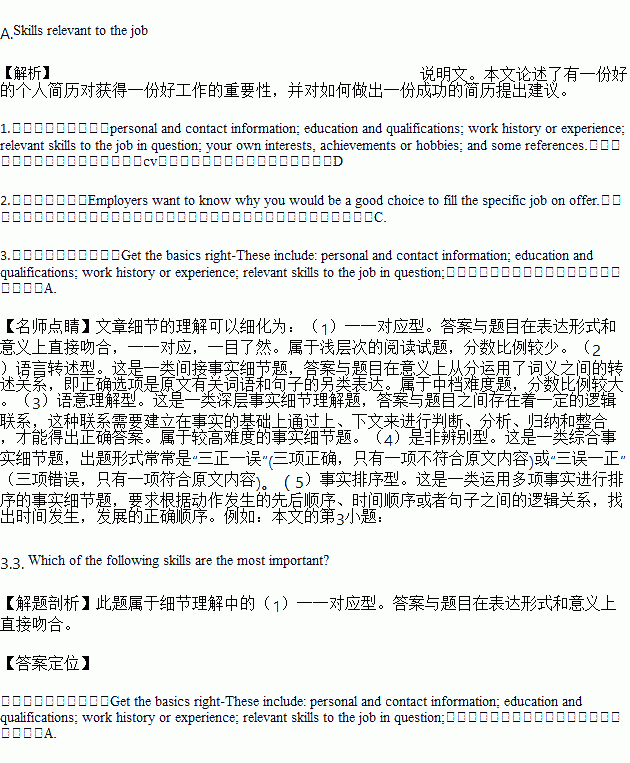题目内容
When it comes to applying for a new job, your CV is the ticket to secure an interview and hopefully, a job. Read the following tips to help you get started in creating a successful CV.
Get the basics right-These include: personal and contact information; education and qualifications; work history or experience; relevant skills to the job in question; your own interests, achievements or hobbies; and some references.
Presentation is key-A successful CV is always carefully and clearly presented, and printed on clean, white paper. The design should always be well-structured and CVs should never be wrinkled or folded. Stick to no more than two pages of A4 paper. A good CV is clear and brief.
Tailor your CV-When you’ve made sure what the job you are applying for involves, create a CV specifically for that job. Any CV you send to a potential employer should be adjusted to that particular job. Don’t be lazy and hope that a general CV will work because it won’t. Employers want to know why you would be a good choice to fill the specific job on offer.
Make the most your skills-Under the skills section of your CV mention key skills that can help you to stand out from the crowd. These could include; communication skills; organizational skills; computer skills; team working and problem solving. Emphasize the things that show off skills you’ve gained and employers look for.
Include references- References should be from someone who has employed you in the past and can confirm your skills and experience. They can also be from a teacher or a principal from your school. Try to include two if you can.
1.What is a CV according to the passage?
A. A ticket needed for a job interview.
B. A basic description of work experiences
C. A well-chosen present for a potential employer
D. A written self-introduction for job application
2.Why do you have to tailor your CV?
A. To make sure what the job you are applying fro involves
B. To show the potential employer that you are not lazy
C. To show you are the right person for the job
D. To make it clear, brief and wll-structured
3.Which of the following skills are the most important?
A. Skills relevant to the job B. Communication skills
C. Organizational skills D. Computer skills
May the first is an important date in the college admission process in the United States.This is the last day for high school seniors to accept or reject offers of admission in the fall.But according to a recent report, there is a great change. Acceptance rates at the top colleges this year were lower than ever.1.
These days, college applicants are applying to more colleges because online and common applications make the process easier.2.On the other hand, deciding students for top colleges to accept can be difficult because it takes much time. Students may not like being put on waiting lists. Also, common colleges work more to get the students they accept to accept them. Some colleges hold visiting days that offer a chance to attend classes and stay overnight. Some universities send gifts.3.
For many families, the most important thing colleges can do is show them the money, especially this year; the weak economy makes parents nervous.4.The recent problems that spread from the housing market to credit markets have even affected student’s loans. So lately, top schools have to spare lots of money to increase their financial aid for students.
5.The Education Department expects the number of high school graduates to start to go down. This will happen as the last of the children of the baby boom generation finishes high school. The number is not expected to start rising again until 2015.
A.Besides, top colleges are facing changes in the population. |
B.What contributes to it? |
C.But a mistake can be costly if it happens. |
D.But top colleges ignore them. |
E. They have international students who know English.
F. It can mean several acceptances to choose from.
G. They cannot afford college as planned.

